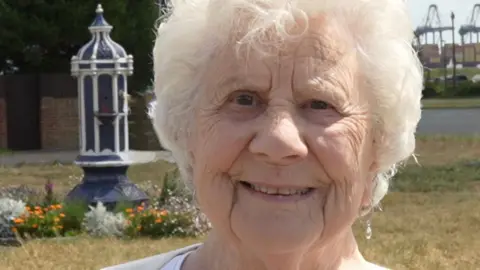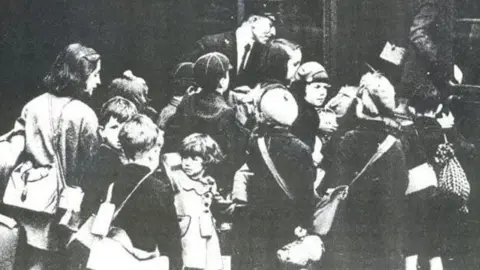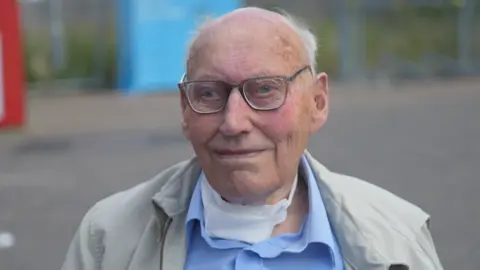WW2 child evacuees mark 85th anniversary
 Jamie Niblock/BBC
Jamie Niblock/BBCFormer child evacuees who are now in their 90s have attended an 85th anniversary event to mark the day they hopped on a train from east to west England during World War Two.
Harwich Town Station was the venue to mark their evacuation from Harwich and Dovercourt in Essex, when children were moved from urban areas that could be targets for bombing by Germany.
On 2 May 1940, some 1,200 local schoolchildren and 77 teachers had a 10-hour train journey with the promise of safety.
Patricia Edgar, 93, was eight years old when she was evacuated to Eyton in Herefordshire where she said she "loved" living on a farm.
 Harwich Museum
Harwich MuseumMs Edgar said she gave her mum a kiss before getting the train. She returned home four years later aged 12.
The day of the evacuation had a normal start.
"We just went to school as normal with our little case and gas masks," she said.
"And then we had to all march down the main road to Dovercourt station.
"I remember her kissing me goodbye, but I can't remember if that was before we left or at the school. But they weren't allowed to come with us."
On the way across country, she said it was a very hot day and she was wearing a big winter coat because thick clothes would have been too heavy for the children to carry.
 Jamie Niblock/BBC
Jamie Niblock/BBCJohn Durrant, 96, was evacuated from Wrabness, just along the railway line west of Harwich.
He was 11 when he was sent to Gloucestershire and said: "I knew what was happening; I knew the war was on;, I heard sirens at night.
"I didn't really want to go, but we were all shoved on."
Mr Durrant said he found a way to get home to Essex after he overheard that the port had been bombed and wanted to check to see if his parents were OK.
When he returned, he realised his parents were unscathed.
"I was at a very impressionable age at the time. I knew the dangers, I knew we were being sent to a safe place," he added.
David Whittle, curator of Harwich Museum, put the event together alongside Steve Delves, assistant curator.
Mr Whittle said the children were at real risk and added: "Harwich could have been invaded, this was just after Dunkirk.
"It was imperative that the children left.
"This port is the closest port to Germany and therefore there could have been an invasion. It could have been vessels coming in and out.
"They might have bombed the harbour."
After the journey, Mr Whittle said the children then had the ordeal of being picked by a prospective foster parent.
Follow Essex news on BBC Sounds, Facebook, Instagram and X.
